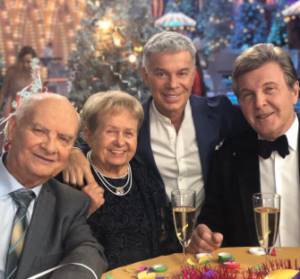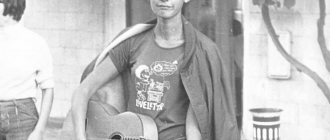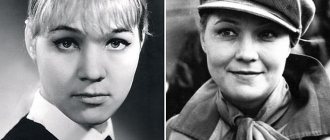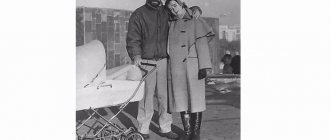Biography of Alexandra Pakhmutova
Alexandra Pakhmutova is a miniature genius of composing art, People's Artist of the USSR, Hero of Socialist Labor, winner of numerous awards.
In the photo: Alexandra Pakhmutova
Every person, remembering this smiling, life-loving woman, associates her songs with some period of their own past or present. “Tenderness”, “Hope”, “The Team of Our Youth”, “Old Maple”... Just to list all her works will require several pages. Sincere and honest, touching and powerful - they have long become the daily history of the country.
Closed topic
Alexandra Nikolaevna does not like to talk about this. For any woman, the absence of her children is a very painful topic. And too personal. It is known that the column “children” in the biography of Alexandra Pakhmutova remained blank. Despite this, a lot of children's songs were written by their family duet. But many fans believe that this is a black streak in the biography and personal life of Alexandra Nikolaevna Pakhmutova.
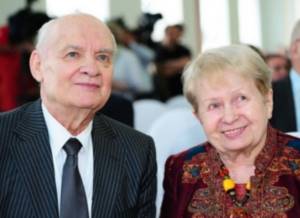
Childhood and youth
Alexandra was born in the fall of 1929 into the family of Nikolai and Maria Pakhmutov from the village of Beketovka near Stalingrad.
Then it was the Lower Volga region, whose residents still well remembered the horrors of the Civil War. Mom, Maria Ampleevna Ulybina (in Kuvshinnikova’s first marriage), lost her husband in the Civil War and remained a widow at less than twenty years old, with two children in her arms - Zoya and Misha. She taught herself hairdressing to support her children. In 1925, she met Alexandra’s father, Nikolai Andrianovich, and married him. Two more daughters appeared in the family - Lyuda and Alya.
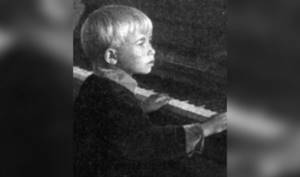
Alexandra Pakhmutova in childhood
Nikolai Pakhmutov was a remarkable personality. His father died in the Civil War - Andrian Vissarionovich was an assistant commander of the Red Army regiment, and he was hacked to death by White Cossacks with sabers in 1921. Nikolai worked at a factory, then got a job at a power plant, at the same time he managed to paint pictures, and was a self-taught player of the domra and balalaika.
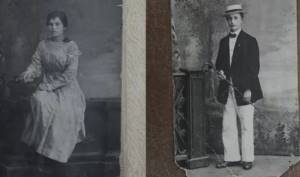
Parents of Alexandra Pakhmutova in their youth
Later, having switched to party work, he created an orchestra at a local club and provided musical accompaniment to silent films in the cinema. By some miracle I got hold of a piano and the house always played works by Chopin, Tchaikovsky, and old romances.
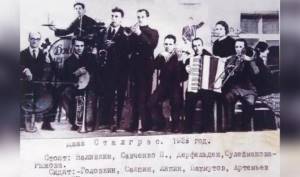
Alexandra's father played in an orchestra
Little Alya grew up on this music. When the little girl was three years old, her father found her playing an instrument. With naughty fingers, the daughter picked out a melody on the keys. Nikolai Andrianovich began to teach the girl everything he knew.
At the age of five, Pakhmutova created her first piece of music, which she and her dad called “The Roosters are Singing.” At a family council, the parents decided that their daughter needed to be seriously taught music, and her mother began taking her to the Stalingrad music school three times a week. Much later, Alexandra Nikolaevna said: Sasha was eight years old when she and her dad performed the first movement of Wolfgang Amadeus Mozart’s Symphony in G minor with four hands at an evening in memory of Vladimir Lenin. The crowded Beketovka club applauded their performance long and heartily. In the spring of 1941, Pakhmutova graduated from the fourth grade of music school and received a ticket to a boarding school at the Leningrad Conservatory. But the war began. We had to forget about Leningrad, the family went into evacuation. For a whole month, Maria Amplievna and her children traveled to Karaganda. Then they lived in Temir-Tau barracks on the banks of the Nura River. Alya was left without a piano, but she had an accordion, which she mastered very quickly.
In 1943, when the family returned home, devastation reigned everywhere. Many people huddled in dugouts. The girl began performing in hospitals in front of the wounded, singing songs and accompanying herself on the accordion. Then she first composed music based on Joseph Utkin’s poem “If you are wounded, darling, in the war.”
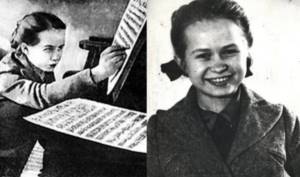
Alexandra Pakhmutova in her school years
Alya really wanted to study further, and when her father was sent on a business trip to Moscow, he took his daughter with him to show her at the Central Music School for Gifted Children. The girl was listened to by Ekaterina Mamoli and Theodor Gutman, who assigned Pakhmutova to the sixth grade of the music school at the Moscow Conservatory.
Dad took Sasha to Malaya Bronnaya, where the Spitsins family, his childhood friends, lived in a communal apartment. They settled the girl with them, promising to take care of her. The People's Commissar of Electric Power Industry gave the daughter of one of the best employees a pass to the departmental canteen, as well as coupons for a suit and winter coat. Alexandra also received an advanced category work ration card, like all students of the Central Music School.
Pakhmutova went to classes in the dark, on foot, so that she could do her music homework before classes started. In 1945, Vera Stroeva made a documentary film “Young Musicians” about Alexandra and her classmates, and then an article with a photograph about the young talented pianist was published in Moskovsky Komsomolets.
Young Alya Pakhmutova on the piano Graduated from the Pakhmutov School with honors in 1948 and entered the conservatory in the theoretical and composition department under the teacher Vissarion Shebalin. Here she established herself as a versatile author: she wrote “Russian Suite”, a cantata based on the poems of Alexander Tvardovsky “Vasily Terkin”, “Concerto for Trumpet and Orchestra”, “Marching Cavalry” based on the poems by Yulia Drunina.
Pakhmutova graduated from graduate school in 1956 with a thesis “Score of M. Glinka’s opera “Ruslan and Lyudmila.” But she did not remain in the genre of exclusively classical music, explaining her desire to write songs like this:
Songs and works
These songs are well known by most Russian citizens and residents of the countries of the former Soviet Union. They were performed by famous pop artists.
- “Russian Suite” (often performed by foreign symphony orchestras).
- “Heroes of Sports” (Spanish M. Magomaev).
- “Where are you, where are you, father’s house?” (words by S. Yesenin, and Spanish by L. Zykin).
- “We will remain in songs” (Spanish: V. Mamonov and N. Baskov).
- "Concerto for trumpet and orchestra."
- “Russian Waltz” (Spanish N. Baskov).
- “Courage builds cities” (words by S. Grebennikov and N. Dobronravov, Spanish by E. Gil).
- “Faith” (Spanish: L. Gurchenko).
- Overture "Youth".
- Ode "Lighting the Fire".
- “All hope is in the metro” (Spanish: L. Leshchenko).
- “Grapevine” (Spanish: P. Dementiev).
- “Belarus” (Spanish ensemble “Pesnyary”).
- “Somewhere in a field, near Magadan” (words by N. Zabolotsky, Spanish by I. Kobzon).
- “City of our glory” (Spanish: L. Leshchenko).
- “The Cherry Orchard” (Spanish: Vitas).
- “Spring of ’45” (Spanish: Y. Bogatikov).
- “Somewhere near Beketovka” (Pakhmutova’s homeland, words by G. Kireev, Spanish by L. Zykin).
- “Before it’s too late” (Spanish I. Kobzon)
- “Geologists” (Spanish Hi-Fi group).
- "We teach airplanes to fly."
- “Our destiny” (Spanish: M. Magomaev).
- “New Day” (Spanish M. Magomaev).
- "Take off!" (Spanish A. Korolev).
- “Scarlet Sail” (Spanish: V. Leontiev).
- “Hugging the sky” (Spanish: L. Leshchenko, E. Gil).
This is only a small part of the songs authored by Pakhmutova. In total there are more than 400 of them. Even the melody for the film “Oh sport, you are the world!” was created with the participation of Alexandra Nikolaevna. Melodies were also written for the films “Girls”, “Battle for Moscow”, “Three Poplars on Plyushchikha” and many others. But pop music occupies a large niche in the composer’s work. I wanted to listen to her songs and listen to them, and the words remained in my memory for a long time. In general, the biography of Alexandra Pakhmutova is notable for the fact that in a creative union with her husband she gave life to most of her songs. After all, the author of the words of more than half of the works is Nikolai Nikolaevich.
The songs and compositions of Alexandra Nikolaevna were known throughout the Soviet Union. Her songs were heard everywhere, from construction sites to Komsomol meetings. What can we say about dance floors? The whole country sang along with Alexandra Pakhmutova.
Creative path
While still at the conservatory, Pakhmutova began writing music for films. The country began to sing “the song about restless youth” in 1958, when Fyodor Filippov’s film “On the Other Side” was released. In addition to her, Alexandra wrote four more songs based on poems by Lev Oshanin and music for this film.
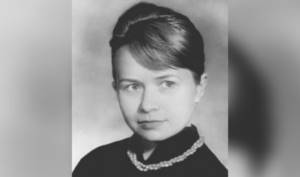
Alexandra Pakhmutova in her youth
Next came the famous “Girls” and the song “Old Maple” with lyrics by Mikhail Matusovsky, which soon became truly popular. The composer responded vividly to everything that was happening in the country. Together with co-authors Nikolai Dobronravov and Sergei Grebennikov, she went on creative trips to the Bratsk Hydroelectric Power Station, Ust-Ilim, and performed in army units.
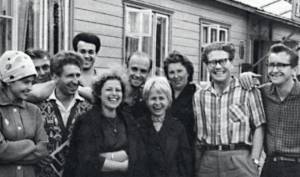
Alexandra Pakhmutova during a visit to the Bratsk hydroelectric power station
When in Bratsk Pakhmutova received an application for a song that would tell about the guys working at the hydroelectric power station, she immediately responded, and not just one, but a whole series of compositions appeared: “Marchuk plays the guitar”, “Taiga stars”, “The main thing, guys “Don’t grow old with your heart” and others.
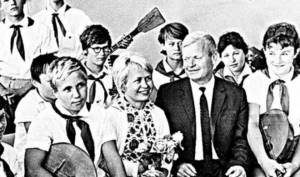
In the camp "Eaglet"
Alexandra seemed to be conducting musical journalism, celebrating with new songs all the important events taking place in the USSR. She wrote about representatives of various professions - builders, geologists, astronauts, athletes. But her compositions were not cliches; they excited and touched people’s souls with their piercing lyricism and accuracy. Pakhmutova's songs were considered an honor to have in their repertoire by Muslim Magomaev, Joseph Kobzon, {ab:959}Lyudmila Zykina{/ab}.
For her friend Yuri Gagarin, Alexandra Nikolaevna created the cycle “Gagarin’s Constellation” of five compositions, both bravura and lyrical, and for the first manned flight into space the song “Eaglets Learn to Fly” appeared.
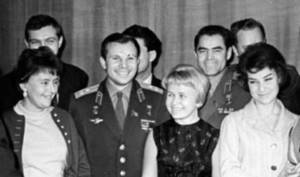
With Yuri Gagarin
For Tatiana Lioznova’s film “Three Poplars on Plyushchikha” she wrote the song “Tenderness”, the first performer of which was Maya Kristalinskaya. And the famous “Nadezhda” was sung for the first time by the legendary Anna German.
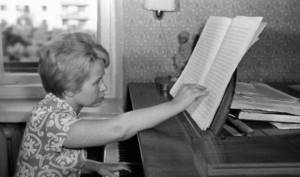
Composer at work
Magomayev’s performance of “Melody” sounded especially soulful, which he sang during his separation from his beloved wife Tamara Sinyavskaya, who was interning at the Italian theater La Scala at that time. Songs of Alexandra Pakhmutova (1979) Pakhmutova’s music sounded solemn and inviting in the official Olympic film “O sport, you are the world!”, in which the pop drummer’s virtuoso solo sounded, and for the film “Wormwood - Bitter Grass” the composer used electronic sound in combination with folk instruments, and she herself played the synthesizer.
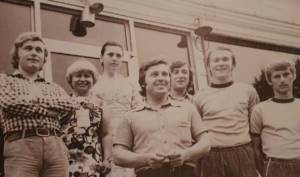
With Dynamo Kyiv players
Alexandra Nikolaevna's creativity is multifaceted and extensive, from classical works to sports anthems and children's songs. She easily wrote overtures (“Youth”, “Russian Holiday”), symphonic poems (“Troika Bird”), a concert for the bell ensemble and orchestra Ave Vita, music for performances (“Great Hungry Men”, “Nina”, “Magic orange").
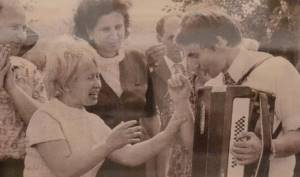
During a visit to Belarus (70s)
The farewell song of the 1980 Olympics, “Goodbye, Moscow!” became special. performed by Lev Leshchenko and Tatyana Antsiferova. Pakhmutova is also adored by hockey players, about whom she wrote the songs “A Coward Doesn’t Play Hockey” and “Our Youth Team.” Interview with Alexandra Pakhmutova (“Visiting Dmitry Gordon”) About forty of the four hundred songs she wrote were included in seven cycles, one of which, “Hugging the Sky,” is especially dear to the composer.
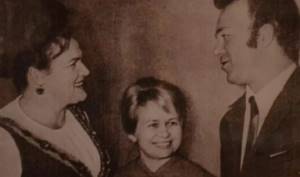
With Lyudmila Zykina and Joseph Kobzon
Alexandra Nikolaevna’s work was expressed differently at different times. Someone accused her of commissioning works from the party, although Pakhmutova was never a member of the CPSU. Others called her the mouthpiece of the era and considered her music simple. Pianist and conductor Mikhail Pletnev objected to this: Alexandra Nikolaevna’s songs were included in the repertoire of many performers. VIA "Pesnyary" and "Syabry" sang "Belovezhskaya Pushcha" and "Belarus", "Spring of 1945" and "The Cherry Orchard" were sung by Yuri Bogatikov. The songs “The Stars Are Getting Closer” and “Temp” were in Sofia Rotaru’s repertoire, and “The Team of Our Youth” was performed by Lyudmila Gurchenko.
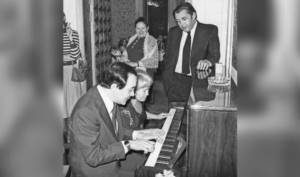
Alexandra Pakhmutova and Muslim Magomaev play four hands
Pakhmutova's compositions were sung by Valery Obodzinsky and Aida Vedishcheva, Valery Leontyev and Mikhail Boyarsky. Among the young performers, Yulian performed at the same time with Pakhmutova’s songs. The song “Russian Waltz” was especially remembered by the listeners.
Her compositions were also included in their concerts by Western performers, including Thomas Anders, the Kreis group from East Germany, and the Living Sound group from Britain.
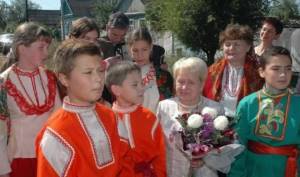
Visit to his native Beketovka (2004)
Pakhmutova collaborated with many famous poets - Rasul Gamzatov, Robert Rozhdestvensky, Andrei Voznesensky, but the most fruitful was her collaboration with the poet and husband Nikolai Dobronravov.
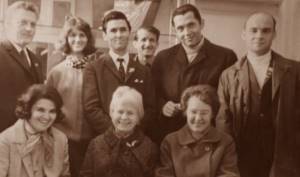
Alexandra Pakhmutova, Robert Rozhdestvensky and Nikolai Dobronravov (right)
In the fall of 2021, the composer was honored at the Bolshoi Theater in connection with his 90th anniversary. Alexandra Nikolaevna, as always, accompanied the performers at the piano - Tamara Gverdtsiteli, Lev Leshchenko, Alexander Gradsky and many other artists who came to her recital. Fragment from the program “Good Morning” Russian President Vladimir Putin, congratulating Pakhmutova on her birthday, presented the hero of the day with the highest award of the Russian Federation - the Order of St. Andrew the First-Called, which headed the long list of prizes and awards received by the composer during his creative career.
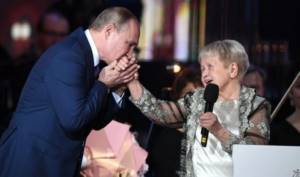
Alexandra Pakhmutova and Vladimir Putin at the anniversary party
In 2021, the creative tandem presented to the audience a new song, “Kursk Bulge,” which they wrote for the military film “Strong Armor.” The composition was performed by Sergei Volchkov, accompanied by the choir of the Sretensky Monastery and a symphony orchestra conducted by Sergei Skripka.
Pakhmutova and Dobronravov told their love story
Despite the long persecution to which they were subjected after the change of the socialist regime, despite accusations of plagiarism (yes, there was such a thing!), laughing at those mocking jokes that the yellow press once allowed themselves to address their family relationships, they do not seem to notice cruelties of the outside world. They create their works without chasing after external and transitory things: neither money nor honors. They are still deeply intelligent, impeccably mannered, and sincerely disposed towards their interlocutor. For the 21st century, they are the same as the fragments of noble families for the 20th century, endowed with that deepest essence about which they say: this is blood! And also - gifted from God. And first of all they find in each other support, consolation, and inspiration.
Therefore, the 90th anniversary, which Alexandra Nikolaevna Pakhmutova celebrates on November 9, is truly their family holiday, a holiday for two. He is her Tenderness, she is his Melody, together they are the creative tandem that has already been forever inscribed in golden letters in the history of Soviet and Russian music.
I, both as a journalist and as a person, was incredibly lucky. I talked a lot with Alexandra Nikolaevna and Nikolai Nikolaevich, and absolutely informally. Some of our conversations became the basis for this publication.
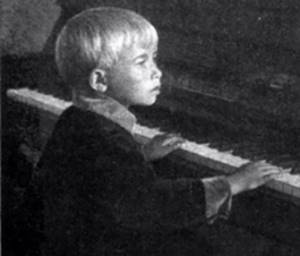
Little Alya 1930s.
“We decided to sign and signed”
The young poet and artist Dobronravov and the young composer Pakhmutova met back in 1956, at the same time their first joint work “Motor Boat” was released - the forerunner of “We can’t live without each other”, “The earth is empty without you”, “The first half we already played”, “Bird of Tomorrow’s Happiness”, “Do you know what kind of guy he was?”, “You are my melody” and others that became just as quotable. Only three months passed between the acquaintance of the two young people and the registration, which later turned out to be a truly stellar marriage.
- How did you two meet? - I asked them. — After all, such talented creative tandems are still very rare.
“We met on the radio,” says Nikolai Nikolaevich, “while working, and that’s how we met.” The editor introduced us to each other and said: well, you are a poet, she is a composer, try to work together.
— And then, as in Bulgakov, “love jumped out in front of us, like a killer jumps out of the ground in an alley, and struck us both at once”?
“Everything happened somehow very quickly,” continues Nikolai Nikolaevich, “they decided to sign and signed.” It wasn’t like it’s accepted now: let’s just live together first, see if we’re right for each other. Besides, we had nowhere to live: neither Alya nor me. We signed and immediately left for a month and a half at sea.
“To Abkhazia,” Pakhmutova adds dreamily.
“Perhaps it was the most wonderful time,” recalls Dobronravov, “the sun, the sea, our friends were with us... And when we were going to the registry office, suddenly such a downpour began!” Such torrential rain! They say this is a good omen that promises a long and happy life together.
— When you live with a person and at the same time are his co-author, does this simplify family relationships or complicate them?
“We have different characters,” Nikolai Nikolaevich shrugs, “of course, difficulties arose, how could we do without them?” But we always had a common position, a common view of things, because it’s not without reason that they say: love is when people do not look at each other, but look in the same direction.
Nikolai Nikolaevich, I can personally testify, he does not deceive. The concept “they won’t breathe on each other” is about Pakhmutova and Dobronravov. The secret of their family happiness can be read at once: they never contradict each other, do not argue, and do not insist on their own at any cost. It is enough for one to say “yes!”, the other will immediately pick up “perhaps you’re right!”, even if it is noticeable that initially he thought differently. Constant mutual compliance, full of close attention to each other: who is this more important now, me or my partner? - this is the key to the strength of their relationship.
They are so suitable for each other that they simply could not help but meet! This would definitely happen, not in Moscow, but in St. Petersburg. But still, the paths from childhood led them both to the capital.
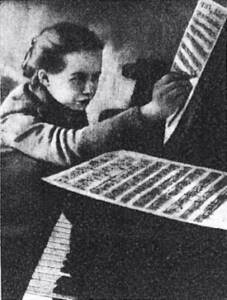
More than 70 years ago, the future legend, composer, author of popularly loved songs Alexandra Nikolaevna Pakhmutova was captured by photojournalist A. Chatskina. The photograph was published in MK on October 20, 1945 with the caption: “YOUNG COMPOSER. There are many gifted young men and women studying in the senior classes of the nine-year Central Music School at the Moscow State Conservatory. ... In the photo: Komsomol member Shura Pakhmutova, a student in the composition class, working on her new work.”
“A representative of the city leadership came out and announced that the concert was over because the war had begun.”
— Alexandra Nikolaevna, a variety of great events are intertwined in your life: war, Victory, the first manned flight into space, the development of virgin lands, the construction of a 500-meter power line, the laying of the Baikal-Amur Mainline, and people who are not inferior in power to giant construction sites. How did it all begin?
— In 1941, when I graduated from the fourth grade of school in Beketovka, where we lived then, I had to go to study at a special school in Leningrad, there was a boarding school there. But the war began. I met her “wonderfully.” On the twenty-first of June there was a concert on the radio of students from our school, I played the finale of Haydn’s concerto, I was 11 years old. Well, I played, and that’s fine. And on the twenty-second there was a concert, for some reason it was called “Amateur Artistic Olympiad,” and I played a waltz of my own composition there. And suddenly, in the middle of the concert, a representative of the city leadership came out and announced that the concert was over because the war had begun.
And, by the way, then under this drama theater there was the headquarters of our troops and a hospital, and across the square in the department store - the headquarters of Paulus. So, for me personally, the war began. And in 1942, when the enemy was already approaching the city, my father and brother remained at the Volga power plant, they worked there, the station was located 18 kilometers from the center and worked throughout the war, and we, when the fighting began in Stalingrad, went to evacuation . There was no piano there, I learned to play the accordion, studied the Kazakh language, and performed in hospitals. I played all the songs by ear, not even expecting that I would one day meet their authors.
— What was your character as a child?
— Judge for yourself: when we returned to Stalingrad, I, with my teenage egoism, told my parents: I need to go to Moscow to study; if you can’t take me, then I agreed with the pilots and they will take me. And these pilots told the parents: yes, we need to take your girl, she made an agreement with us! And, by the way, such responsiveness was also a sign of the times. Then my parents bought me a coat and took me to Moscow. Central Music School at the Moscow Conservatory. Tchaikovsky, where I entered, was also evacuated, but in 1943 she already returned to the capital. And so they assembled a commission... I put the padded jacket on the piano... (Laughs.) In general, they made a verdict that I needed to be taught, and I stayed. There was no boarding school at the school, but my parents had friends in Moscow, the Spitsins, and I began to live with them in one room in a communal apartment. There was a war, the windows were covered with newspapers due to bombings...
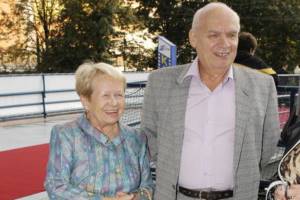
Alexandra Pakhmutova and Nikolai Dobronravov were made for each other. Photo: Liliya Sharlovskaya
— What was your strongest impression at the moment when you found yourself in Moscow and entered school?
“In the evening, after the commission, my father and I went to the theater, we didn’t manage to go to the Bolshoi, there weren’t a single ticket at the Stanislavsky and Nemirovich-Danchenko Theater. The father says: “Girl! We came from Stalingrad." That was all then! They gave us two tickets, “Onegin” was on, no buffets, someone was gnawing carrots during intermission... Then we, already students of this special school, spent days and nights in the Great Hall of the Conservatory, ran to rehearsals, it was such happiness! Such musicians as Goedicke, Glier, Igumnov were alive, and Goldenweiser talked about his meetings with Tolstoy.
— Did you know right away that you would become a composer?
— I knew that I would go to the conservatory and study composition. I wouldn’t have made it as a pianist, I had small hands and a limited repertoire.
— Nikolai Nikolaevich, tell us about your childhood. You are not a Muscovite, it could have happened like this: you would have walked along another street, not met her, not found her?
— I come from Leningrad, if the war had not happened, Alenka came there to study, but during the blockade I was evacuated, and in the end I ended up in Malakhovka near Moscow, where I studied. So our meeting was predetermined from above. Of course, I did not study at such an elite institution. But I had a literature and Russian language teacher, Yakov Vasilievich Vasilyev, who was also the director of our Malakhov school. I still keep his gift for my graduation in 1947; he gave me the “Pushkin Calendar”, on which it was written: “Kolya, this is one of my favorite books. I ask you to love and remember me.”
He knew that I write poetry. One day we were sitting at school, in our coats, the room was not heated, the ink was freezing, it was the 5th or 6th grade. And he suddenly says: Kolya Dobronravov, promise me that you will do what I ask you to do now, give me your word. I said: of course. And then he says: when I die, come to my grave and read the poem that I will read now, it is my favorite, and today we will go through Lermontov. And he began to read: “The night is quiet, the desert listens to God...” And I fulfilled his request, he was already elderly, probably taught before the revolution, and died shortly after my graduation. And I came to his grave with my classmates and read these poems.
— At that time, was it okay for boys to love poetry?
“We boys earned as much as we could - we cut down pine trees, and with the money we received we went to Moscow and went to the Moscow Art Theater. Yakov Vasilievich Vasiliev was an amazing teacher, from him I learned about the poetry of the Silver Age, I learned Yesenin’s poems. I read Yesenin for the first time when I was traveling to Moscow and looked into the book of a fellow traveler, he was reading poetry, and - and I have a good memory - I later reconstructed them from the rhymes. And only then Yakov Vasilyevich told me that it was Yesenin.
And one day, at a neighboring dacha on the terrace, I found a pre-war binder of Ogonyok and came across the lines “I imagine how cherry and peach it is here in the spring, under the spicy sun of Chisinau” - this was Severyanin. The next day I went to Moscow to a second-hand bookstore, and the war was going on, it was 1943, and there they found me two books of his poems, published in the 19th and 21st years, I still have them.
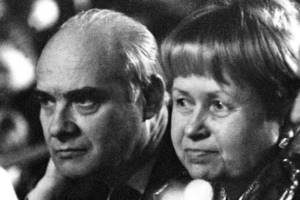
Photo: Gennady Cherkasov
"The Fight Continues" in New York
They grew up, learned and decorated the whole world with their creativity. Their songs... They, like amber stones, store moments in time and fragments of the country's history. Songs of Komsomol romance and songs from the most famous Soviet films.
About 400 songs flew out from under the fingers of Alexandra Pakhmutova; there is no truly stellar name on stage who would not sing them. Lyudmila Zykina, Muslim Magomayev, Joseph Kobzon, Lev Leshchenko, Lyudmila Senchina, Valery Obodzinsky, Sergei Lemeshev, Georg Ots, Eduard Khil, Valentina Tolkunova, Edita Piekha, Valery Leontiev, Alexander Gradsky, Nikolai Baskov, Larisa Dolina, Tamara Gverdtsiteli, Nadezhda Babkina and others. Not to mention the Alexandrov ensemble, the Pyatnitsky choir, the ensembles “Pesnyary”, “Gems”, “Nadezhda”, “Verasy”, “Syabry”, “Flame”, the group of Stas Namin and others. Who else can boast such a stellar cast?
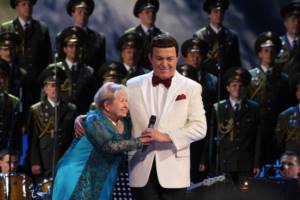
With my favorite performer and great friend Joseph Kobzon. Photo: Liliya Sharlovskaya
And the song “And the Battle Continues Again” was once the main song of November, not a single demonstration in honor of the next anniversary of the Great October Socialist Revolution was complete without it, then it became the very work for which Pakhmutova and Dobronravov were blasphemed, accusing commitment to the socialist regime, belonging to the party aristocracy. Although they were not even in the party... And for this, the secretary of the board of the Union of Composers of the USSR, Alexandra Pakhmutova, and the laureate of the USSR State Prize, poet Nikolai Dobronravov, were not given an apartment for a long time.
— We lived in a communal apartment, in a room. But I didn’t want to tie myself down,” says Alexandra Nikolaevna. “A high-ranking party member would come to me, have a preventive conversation, get into the Volga and leave.” What, am I going to work for them all my life? I do not regret anything. Life would have turned out completely differently - and you would not have heard many songs.
And that same “And the Fight Continues Again” recently suddenly sounded on the streets of New York - street dancers loved to break dance to it.
— When I was preparing to meet you, I could not find a video recording of one of your most beautiful songs performed by the legendary Anna German — “Nadezhda.” Weren't they filming it?
“They filmed it,” Pakhmutova answers, “even twice.” But they demagnetized it because film was in short supply at that time. Lapin once called us, he was then the chairman of the State Television and Radio Broadcasting Company, and said: you recorded “Nadezhda.” We say: yes, Sergei Georgievich, but it was demagnetized. He says: it can’t be, we don’t demagnetize anything! - and hung up. Then he once met us in the theater, came up and said: yes, you were right, this recording is not left...
- Anna German is probably the only one who today can compete in popularity with any - both Soviet and Russian - performer. Frankly speaking, not without your help, after all, “Nadezhda” is her signature song.
- No, well, of course, she had other wonderful Soviet songs in her repertoire, although “Nadezhda” became very popular. But Anna German herself was wonderful: so bright, sincere, there was not the slightest drop of falsehood in her.
— Your other song calling card — “Tenderness” — went to Maya Kristalinskaya and made her the best singer of the year in 1966, according to a TV viewer poll.
— When Maya performed “Tenderness” for the first time at the concert, she left the stage to the sound of her own heels. But she stubbornly continued to sing it, and about the eighth time the viewer finally accepted the song, and then fell in love with it. So we consider Maya to be the co-author of this song,” says Dobronravov, “the song became known all over the world, it was performed in different languages.
“Maya was also underestimated, although today it is believed that she was in favor of the Soviet regime,” adds Pakhmutova, “but when we fought to raise her concert rate, they answered us: “How can you? She has no professional education! She has an aviation institute!”
— Alexandra Nikolaevna, tell me, don’t composers get annoyed when a performer changes the tempo? To be honest, it infuriates even me, the listener, when suddenly a familiar melody sounds, so to speak, at a different speed.
- Annoys! But if it is convincing, then you can accept it. Muslim Magomayev once said: “I have a principle: I sing a slow song even slower, and a fast song even faster!” And he made such a bullfight out of our song “Heroes of Sports”! And then he sang it very often.
- And for this, as you promised, you gave him a song with six flats?
Alexandra Nikolaevna laughs:
— It turned out to be in D minor, I had to take it a semitone lower, and there was only one flat left. This was “Melody”. When I showed it, he liked it so much that he didn’t wait for the score. Actually, I never give away a song without a score, but then he asked for the keyboard. He had a concert in three days, and during this time he had already ordered an arrangement and sang it with great success. Then I made my own arrangement, and Muslim recorded “Melody” based on my score.
— The fate of your songs is happy, since they fly all over the world, are you known abroad as authors?
“When Alexandra Nikolaevna once asked the owner of the famous German copyright agency Sikorsky: “What needs to be done to make a Soviet song popular all over the world?” says Nikolai Nikolaevich, “he replied: “Nothing for you!” Just write another “Tenderness”, everyone sang it!” Yes, many songs are covered abroad; by the way, they are very popular in Japan. But still, Alexandra Nikolaevna is well known abroad as a composer who writes symphonic music. Discs are published and are available for sale there. It’s just that the United States, for example, stands guard over its show business, just as we stand at state borders. After all, this is such money! And they will never let anyone into this area...
They are very real: brilliant and at the same time simple, incredibly sincere people. Strong! No one is asked for any physical help. “We do everything around the house ourselves, there are a lot of shops around and they are quite good,” Alexandra Nikolaevna answers my question. They never ask for financial support: they agree to perform for surprisingly little money, or even for free, because the main thing is demand and genuine interest. And even Vladimir Putin, who came to visit them for Alexandra Nikolaevna’s 75th birthday, did not ask for anything. "What for? - Nikolai Nikolaevich was surprised at my surprise. “We have enough of everything.” And this is “everything” - a small three-room apartment of Soviet layout and square footage, where books and sheet music, and a dacha near Moscow, mostly live.
I endlessly love visiting them. They will definitely both come out into the hallway, both to meet you and then to see you off. During the conversation, Nikolai Nikolaevich will definitely read some amazing poetry, and then tell a witty joke - “from Kobzon.” Alexandra Nikolaevna will definitely pack the table and, of course, will wave away help. And after feeding me and drinking tea from thin porcelain cups, she will sit down at the piano - after all, she knows how much I look forward to this moment! And she will answer all my questions, no matter how stupid - “Alexandra Nikolaevna, do composers first select a melody with their right hand, and then add accompaniment with their left, or do they compose with both hands at once?” - they were not. And he will show you how to transpose to another key if your voice does not hit the top note, and he will explain what size of verses is most convenient for writing music. And he will even sing “The Night is Short” for me, first in an academic voice, breathing professionally, and then “as pop singers do,” and I, of course, will cry with delight.
One day, already leaving them, I half-jokingly asked: “Alexandra Nikolaevna, can I tell everyone that Pakhmutova herself taught me music?” She suddenly answered very seriously: “It’s possible, Tanya! The main thing is that you are interested and that you are learning! Nowadays, few people like and know how to do this.”
Personal life of Alexandra Pakhmutova
Since 1956, Alexandra Nikolaevna has been married to the only and beloved man in her life - the poet Nikolai Dobronravov.
They met on All-Union Radio, where the poet read poetry for a children's program. The head of the music editorial office, Ida Gorenshtein, suggested that they compose a good song for the children who were starting their summer holidays. And the “Motor Boat” was born, about which the couple jokingly says that on it they set off together to sail through life. They got married in August of that year.
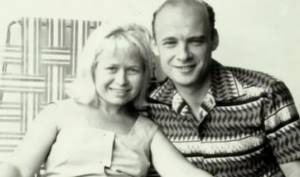
Alexandra Pakhmutova and Nikolai Dobronravov in their youth
When we approached the registry office, a downpour began to pour, although before that it had been very hot. The omen was considered lucky for later life. Sasha was wearing a pink suit sewn by her mother and sister. Having signed, they had a modest wedding and went on a honeymoon trip around Abkhazia, and upon returning to Moscow, they got to work.
Their family and creative tandem became an example of inspiration, even in songs about the Komsomol and Lenin they spoke about universal human values: dreams, love, joy. Rodion Shchedrin once said about their joint works: “God shone a flashlight for them...”. Almost every new song of the creative duo became a hit.
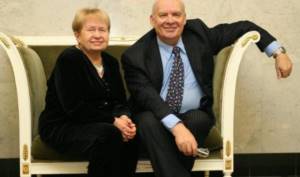
The couple have been together for over 65 years
The couple did not have any heirs, but their unspent love extended to young talents, many of whom were given a start by the poet and composer into a creative life. The songs “Doctor Aibolit”, “Gaidar Steps Ahead”, “Eaglets Learn to Fly”, “Wonderful Counselor” and many others were performed by young soloists accompanied by the Big Children's Choir of the All-Union Radio and Television. Many performers, even growing up, called Pakhmutova and Dobronravov their second mother and father.
Is there a recipe for a strong marriage?
The strong and happy marriage of this couple is based on complete mutual understanding and support. They try not to find fault with each other, especially over trifles. It is not customary for them to contradict each other, argue or get their way at any cost - the compliance of each of the partners is present in everything.
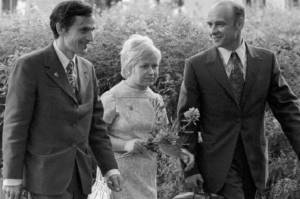
Alexandra Nikolaevna and Nikolai Nikolaevich are very attentive to each other - this can be felt in absolutely everything. Even now, after many years of living together, they call each other nothing more than Alechka and Kolechka.
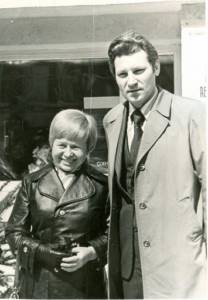
Alexandra Nikolaevna and Nikolai Nikolaevich are not only husband and wife, but also faithful creative partners, as well as closest friends. In their home there is always an atmosphere of endless comfort and warmth, which is pleasant to be in - many first-rate Soviet pop stars spoke about this, speaking of them as the most hospitable family.
Hostage to one role. The series “Happy Together” broke the career of Daria Sagalova
“Vulgarity is about the obvious with pathos”: Andrei Myagkov about art and life
"St. Petersburg Opera" presented its version of "Electra": information and photos
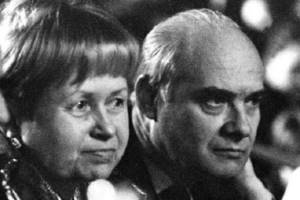
Alexandra Pakhmutova now
In the spring of 2021, the composer made her first public appearance after suffering from coronavirus at the beginning of the year. Together with her husband, she underwent a preventive examination at one of the paid medical centers in Barvikha, where they contracted the infection. The couple was hospitalized at the Central Clinical Hospital and discharged three weeks later.
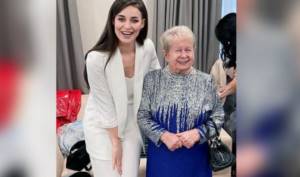
Alexandra Pakhmutova at the celebration of the 98th anniversary of CSKA
Pakhmutova and Dobronravov were in self-isolation at their dacha in Peredelkino, then moved to a Moscow apartment. And if earlier in the program “Hello, Andrey!” Alexandra Nikolaevna participated via video link, but she arrived in person to celebrate the 98th anniversary of CSKA, which incredibly pleased her fans and participants of the gala event.
Home of Alexandra Nikolaevna Pakhmutova
Accept each other as they are, compromise - this is the motto of this happy married couple who have lived together for so many years, communicating with each other tenderly and affectionately. From the outside it looks like this: a tall, intelligent man walks sedately, and next to him minces a miniature (149 cm tall) woman, strict and fragile, gentle and creative. And all these qualities appear simultaneously. Outwardly so different, but going in the same direction in life, they carefully preserve their family hearth, and it is impossible to imagine them without each other.
Interesting Facts
- One of Alexandra Pakhmutova’s hobbies is football; together with her husband, she supports the Russian national team, as well as the Rotor team from the city of her childhood, present-day Volgograd.
- In 1976, Crimean astronomers discovered a small planet between Mars and Jupiter, which they named after the composer. Planet #1889 is officially registered at the Cincinnati Planet Center. An asteroid is also named after “Pakhmutov”.
- The song “Magnitka”, written by Pakhmutova and Dobronravov, by decision of the Magnitogorsk deputy corps, became the official anthem of the city, and the anthem of Yaroslavl became their composition “My Yaroslavl, the city-prince”.
- The “Nadezhda” competition, which is supervised by Alexandra Nikolaevna, is held in the form of a festival in Nizhny Novgorod, and children from disadvantaged families and the disabled have the opportunity to participate in the “White Steamship” musical project, founded by the composer.
- One day Pakhmutova was surprised and made laugh by a call from Israel. A complete stranger asked for permission to use one of the tunes she wrote as a ringtone for his cell phone.
- For the 90th anniversary of the beloved artist in Volgograd, in the park named after Alexandra Pakhmutova, a sculptural composition of a girl with an accordion was installed, symbolizing the beginning of the creative path of the People's Artist of the USSR.
Awards
The composer has received many awards and prizes. There are a great many of them, and it is simply impossible to list them all. Here are some of them:
- USSR State Prize for songs of 1971-1974.
- USSR State Prize for the soundtrack to the film “Oh, sport, you are the world!”
- Lenin Komsomol Prize in 1966.
- Prize of the Ministry of Defense of the Russian Federation for contribution to culture and art.
- Foreign orders.
- Order of Francis Skaryna. Awarded in 2000 in Belarus for strengthening Belarusian-Russian cultural ties.
